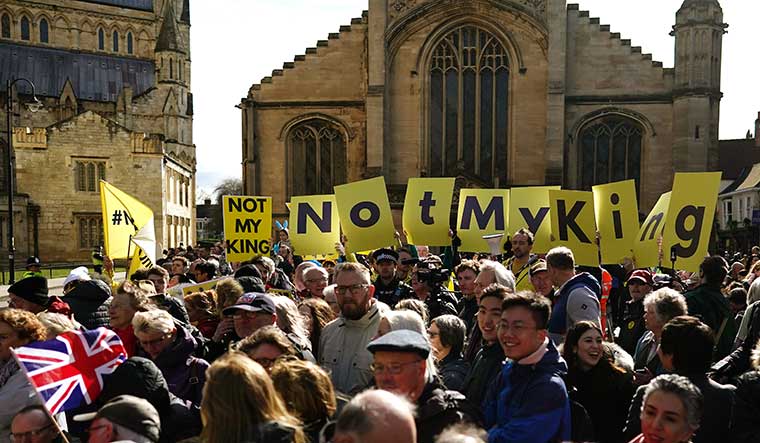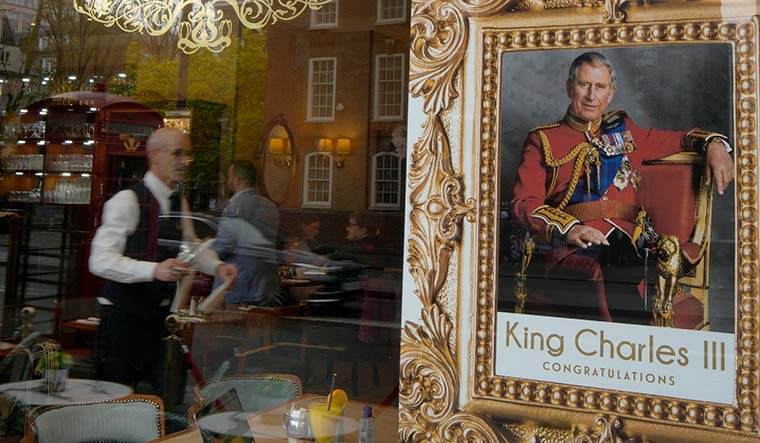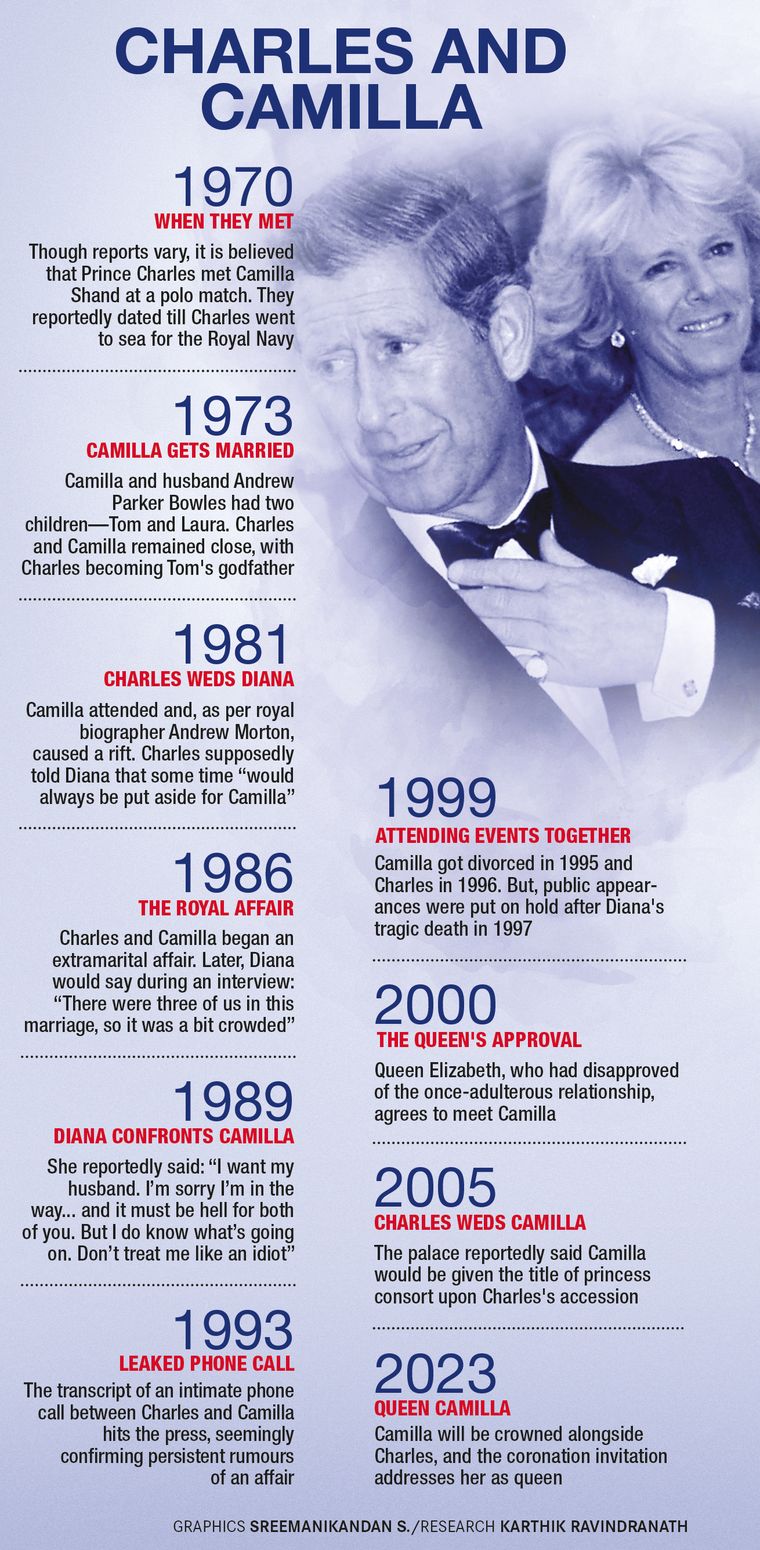On May 6, as King Charles III and Queen Camilla are crowned in all their finery at Westminster Abbey, over a thousand people, dressed in more modest yellow T-shirts will be gathered down the road at Trafalgar Square, clutching in one hand their water bottle, potato crisps and sandwich and in the other a yellow placard screaming, “Not my King”. Similar protests will take place in Cardiff and Nottingham, as well as in the Scottish cities of Edinburgh and Glasgow.
Ultimately this feeble whiff of republicanism may not dampen the coronation party. A troubled world will inevitably pay attention to this glittering extravaganza, if nothing else than as an anachronistic bejewelled distraction, steeped in pageantry and richly doused with a mysterious ritual that goes back to the ancient Kings of Israel. But this coronation is unlikely to have the idealism, the romance or even the patriotic sentiment that attached itself to the black-and-white 1953 event, when a young and vulnerable-looking Elizabeth took charge of a war-battered kingdom. Instead, more mundane questions have been swirling around the event: Will the Sussexes be invited? By last reports only Harry will come, though it is not quite clear where he will sit. Will Camilla wear the Kohinoor? Thankfully not. Will she be crowned Queen or Queen Consort? Well, if a King cannot make his wife Queen…. Will the song I’m Gonna Be (500 miles) be part of the coronation music playlist? It will not, given the republican tendencies of the band, The Proclaimers. Clearly the confetti will still come down by the bagful―since an estimated 100 million pounds is being spent on it―but once it has settled, the reflection on the monarchy’s future, in full swing since the passing of Queen Elizabeth II last September, will continue unabated.
 ..TO NOT MY KING: Protesters wait for the arrival of King Charles III and Queen Consort Camilla in York | Getty Images
..TO NOT MY KING: Protesters wait for the arrival of King Charles III and Queen Consort Camilla in York | Getty Images
When the new monarch appears, as per tradition, at the balcony of the Buckingham Palace, he will be all too aware of the challenges gathering beyond the wrought iron gates. Prime among these is the need to maintain public support for the monarchy, for it is ultimately public will―and not divine grace―that sanctions the House of Windsor today. In recent polls, nearly 60 per cent still support the monarchy while 26 per cent would prefer an elected head of state. But there is a disturbing generational angle: a much larger percentage of support (78 per cent) exists in the over-65s, while it crashes to 32 per cent among the 18-24 age group, with only 12 per cent of this group regarding the institution as “very important”.
To maintain even this level of support is not going to be easy. First of all, the King is the not the Queen, if you know what I mean. The Queen―in popular perception of living generations, there really will be only one―was, to quote former prime minister Boris Johnson, “a changeless human reference point in British life”, a pillar of stability, dignity and political neutrality; the public outpouring of grief at her passing was genuine and widespread. Charles, on the other hand, besides being the oldest monarch to be crowned, comes through as awkward and impatient (remember the leaking pens?). The baggage of his breakup with Diana, which broke the heart of global romance, has not quite been shed, despite the miraculous rehabilitation of Camilla. His frequently expressed political opinions to government members, evidenced in his “black spider” letters (the reference being to his squiggly signature), could invite accusations of political meddling if not strictly curbed. And, of course, the family is at war with itself. Prince Andrew’s antics have brought back the spicy whiff of sex to the royal soap opera and the revelations of the Harry-Meghan firm have shown up the royals as misogynist, racist and inflexible. Even Meghan’s absence at the coronation is being read by some as a calculated snub to the King; on the other hand, her presence would have been a protocol and PR nightmare that is best avoided.
In a country struggling with a serious cost-of-living crisis, questions about public funding of royal indulgences are inevitable. Half the people polled felt that the King should pay for his own coronation. Others ask why have a coronation at all: after all, other European monarchies work perfectly well with just proclamations. Royal finances―even the wills of obscure royals―are shrouded in secrecy, leaving the field to investigative journalism led by The Guardian. Under the Sovereign Grant―David Cameron’s 2011 funding arrangement that replaced the civil-list system are far more transparent―the monarch presently receives 86 million pounds a year in public money as well as a share in the Crown estate profits, which could amount to another 250 million pounds. This is embarrassing enough for the King to have asked for a reduction in future payments; already his personal wealth has been estimated at 1.8 billion pounds, though the Palace has dismissed the estimate as “a highly creative mix of speculation, assumption and inaccuracy”.
Much else is coming into the public domain: the millions of pounds that go to the royals from the two hereditary estates, the duchies of Cornwall and Lancaster, under a long-debated arrangement; the monetisation of the two country estates of Balmoral and Sandringham, including the renting of 300 houses at the latter; the equine assets of the late Queen and much else. The several costly gifts, works of art and costly jewels with the royals are also under the scanner, with calls for more clarity between official and private holdings under the gift policy, which interestingly came into being only in 1995.
Calls for present transparency mingle with demands to settle with a dark past. Ancestors of the royals have long extended patronage to trans-Atlantic slave trade and owned slaves of Virginia’s tobacco plantations. These revelations only go to fuel demands for reparations for colonial repression and strengthen the moves to republicanism, particularly in the Caribbean realms. Barbados has already left the group of 14 countries that still regard the British monarch as head of state; Jamaica, Antigua and Barbuda, as well as St Vincent and the Grenadines, are seriously debating similar moves. To limit damage, Charles has offered to support research into the “appalling atrocity” of slavery; such calibrated admission, falling far short of apology, will only prove to be too little too late. Ultimately, the departure of a Caribbean realm or two, or even distant Australia, may be less serious than a breaking away of Scotland, or a reunification of Ireland. It will be small consolation then that an independent Scotland would retain Charles as head of state; Ireland certainly would not. Charles would end up being King of England and Wales, which, after all the razzmatazz of the coronation, doesn’t quite have the right ring to it.
Despite all these challenges, it is quite possible that the monarchy may yet muddle through for the foreseeable future. Much will depend on how King Charles tailors his ceremonial role, introduces transparency and brings the larger family in line. His accessibility to the public and parliament post his accession goes to his credit. His restriction of the family to seven working royals, the relative scaling down of the coronation, the presence of multi-faith leaders in an abstruse Christian ceremony are small steps to reflect a modern and diversified country. What is perhaps most important is that much of conservative heartland Britain may still need the idea of a monarchy. It provides an X-factor, a certain oomph and tabloid-level distraction from the political uncertainties and harsh economic realities of a post-Brexit United Kingdom. With some luck and imagination, King Charles III may yet steer the HMS Royalty into safer waters of the 21st century.
The author is former High Commissioner to the UK and author, most recently, of the novel Crimson Spring.



